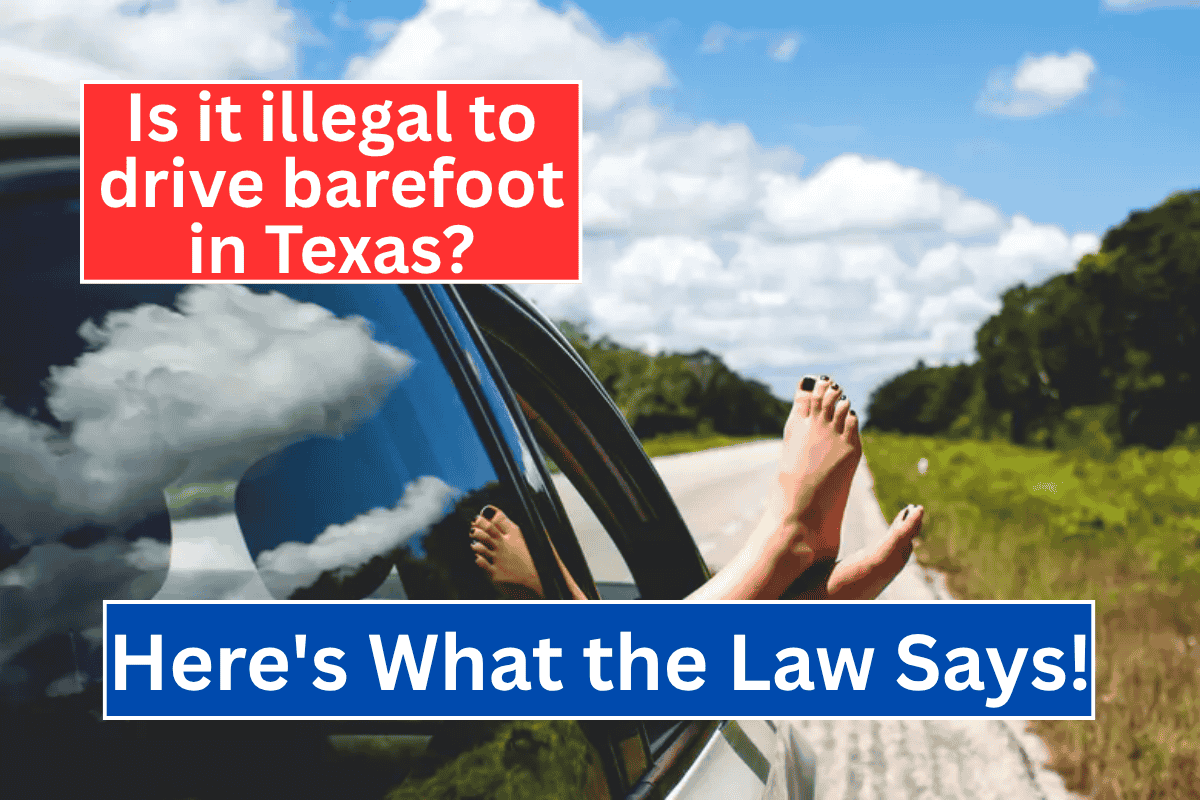If you’ve ever wondered whether driving barefoot is illegal in Texas, the good news is that it is not illegal to drive a car or truck while barefoot in Texas. In fact, no state in the U.S. specifically outlaws driving barefoot. However, just because it’s not against the law doesn’t mean it’s always safe.
Let’s explore the pros and cons of driving barefoot and why you should think twice before getting behind the wheel without shoes on.
Safety Considerations: Why Shoes Are Safer
While it’s legal to drive barefoot in Texas, safety should be your top priority. Driving without shoes might seem like a minor choice, but it can make a significant difference in how well you control your vehicle, especially when operating the pedals.
Here’s why shoes are recommended for driving:
- Better Traction: Shoes with a flat sole and solid traction help you maintain better control over the brake and accelerator pedals. Bare feet can easily slip off the pedals, especially if your feet are sweaty or slippery.
- Even Force Distribution: Wearing shoes ensures that the force applied to the pedals is evenly distributed. Bare feet don’t provide the same level of pressure and stability, which could lead to a dangerous situation, especially when the anti-lock braking system (ABS) engages.
- Protection from Heat: Without shoes, your feet are exposed to the heat of the pedals, which can make you take your foot off the pedal when you need to press it. This could result in a delayed reaction, potentially causing an accident.
- Debris Hazard: If you’re involved in an accident, you risk walking barefoot on broken glass or other dangerous debris that can cause injury.
Legal and Liability Issues: What You Should Know
While it’s not illegal to drive barefoot, lack of appropriate footwear could potentially lead to legal consequences. If you’re involved in a car accident and the police believe that your choice to drive barefoot contributed to the accident, you could face charges for reckless driving or negligence.
This could also be used as evidence in a personal injury claim.
If you’re injured in an accident caused by a barefoot driver, it’s wise to consult with a personal injury lawyer. An experienced lawyer can help gather the necessary evidence to prove that the other driver’s footwear choice contributed to the accident.
Shoes to Avoid While Driving
Not all shoes are created equal when it comes to driving. While any shoe is safer than going barefoot, some footwear is better suited for driving than others. Here are shoes you should avoid when driving:
- Cowboy boots: The raised heel can interfere with pressing the pedals properly.
- Work boots: Large and thick, they can obstruct your foot’s movement and make it harder to feel the pedals.
- Flip-flops, mules, or Crocs: These shoes don’t secure to your foot properly, making them prone to slipping off and interfering with pedal operation.
- House shoes: Loose and malleable, these shoes don’t provide the necessary traction for engaging the pedals.
- Wedges: The thick soles make it harder to judge the pressure on the pedals, and they’re more likely to get stuck under the pedal.
- High heels: Hard to pivot on your heel from the accelerator to the brake, which can lead to fatigue and slower reaction times.
- New dress shoes: Leather or wood soles are often slippery until they’re broken in, making it difficult to maintain solid contact with the pedals.
The Best Footwear for Driving
To ensure maximum safety and control, shoes with a flat sole and good traction are your best option when driving. You don’t need to wear driving-specific shoes, but having a comfortable and secure pair of shoes in the car is always a good idea.
Why You Should Wear Shoes While Driving
In summary, it’s not illegal to drive barefoot in Texas, but it’s definitely not the safest option. Wearing proper footwear provides the best traction and control when driving, reducing your risk of accidents caused by slippage or delayed reactions.
Even though barefoot driving isn’t against the law, it’s essential to prioritize safety—both for yourself and for others on the road.












